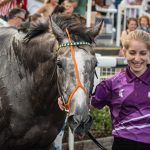British Racing School announces new dates for Environmental Sustainability Module
New dates for 2024 have been announced for the groundbreaking Introduction to Environmental Sustainability in British Horseracing course at BRS. More places have been funded on the two new dates by the Racing Foundation for eligible participants.
The recently launched Introduction to Environmental Sustainability in British Horseracing module, devised by the British Racing School in conjunction with sustainability experts White Griffin, is the start of a new wave of action towards combating environmental damage from within the racing industries.
After such shocking recent images of racecourses fully submerged by ever increasing flood water levels, and summer images of parched paddocks, it’s impossible to avoid the fact that climate change is having an impact on our industry. A brand new module, presented at the British Racing School, has been tailor-made to highlight the impact of current practices and educate attendees on simple actions to take to minimise their individual and their company’s environmental footprint.
Sustainability experts, White Griffin, have worked extensively within the equestrian and sporting industries internationally, and are inspiring equestrians across the UK. Working with organisations such as York Racecourse, The British Equestrian Federation, European Equestrian Federation, Racing Welfare, World Horse Welfare, British Showjumping, British Dressage and many more, they are playing a huge part in affecting positive change for the equestrian industries.
Director of White Griffin and creator of the course, Ruth Dancer, said “horse racing and equestrianism are gravely impacted by climate change and it is important that both industries work to understand how we must adapt for the road ahead. Equally, we have a significant impact on the environment and can be a force for good if we amend our practices. The first step is to understand the topic and this course is the opportunity for anyone working in our industries to gain confidence in knowing what the situation is and practical ways to respond. I am very proud to work with the British Racing School and Racing Foundation on this project for a second year.”
Another organisation taking proactive steps to address environmental sustainability is York Racecourse, a host venue for one of the 2024 British Racing School courses. York have been working for five years on their environmental impact and in 2023 they released their sustainability strategy, which included news of the 50% reduction in emissions they have already achieved, as well as becoming the first independent racecourse worldwide to sign up to the UN Sport for Climate Action.
The racing industry itself has a large footprint not just of emissions, but water usage, resources and waste. As landowners as well, the equine industry is in a unique position to support biodiversity, both in support of nature but also in increasing carbon sequestration. Equine sports and horse racing represent the sport of the land and as such, have a considerable role to play in demonstrating effective stewardship. It is imperative that businesses and individuals work hard to reduce the negative impact of the sport on the environment, to ensure a sustainable sport for future generations.
Elizabeth Sullivan, Operations Manager at the British Racing School feels ‘The impact that climate change is having on the horseracing industry cannot be ignored, and in order to safeguard our sport for the future, action needs to be taken. Providing an Educational resource such as this course, to the Thoroughbred industry, is hugely important, as educating on, and understanding Environmental Sustainability, will allow the industry to establish strategic and long-term responses to climate change that will have the impact needed.’
During the course, participants can expect to be updated on the broad range of progress made to date by the industry, including work by individual racecourses like Ascot, recipients of the 2023 Racing Foundation Green Award, the new equine carbon calculator tool, and supply chain advancements by pioneering company Duralock, who have released data on their circular economy fencing model.
Foundation course students at the British Racing School will be studying the new module as part of their residential stay at the School, and it is hoped that this will play a part in inspiring the new stable staff and jockeys of the future, to play their part in protecting our planet. The standalone course dates for 2024 are 23rd April (at the British Racing School) and 26th November (at York Racecourse).
To register your interest, email courses@brs.org.uk or call 01638 675907.
Visit brs.org.uk to find out more about studying at the British Racing School and all the courses on offer.

